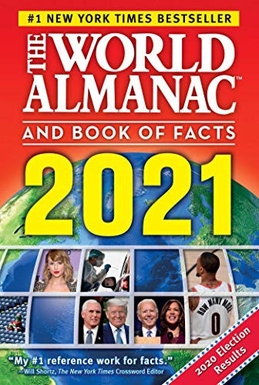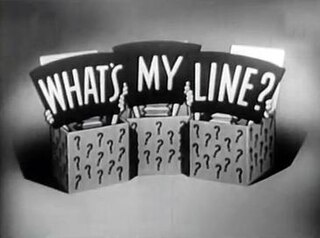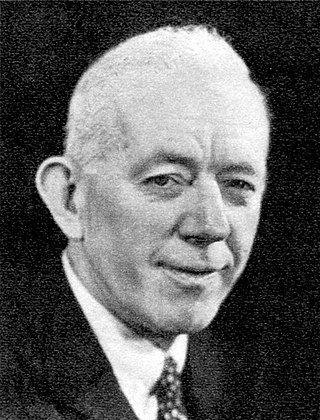
Match Game is an American television panel game show that premiered on NBC in 1962 and has been revived several times over the course of the last six decades. The game features contestants trying to match answers given by celebrity panelists to fill-in-the-blank questions. Beginning with the CBS run of the 1970s, the questions are often formed as humorous double entendres.

The World Almanac and Book of Facts is a US-published reference work, an almanac conveying information about such subjects as world changes, tragedies, and sports feats. It has been published yearly from 1868 to 1875, and again every year since 1886.

Bloomberg Wall Street Week (WSW), is an investment news and information TV program airing Friday nights on the Bloomberg Television. The original weekly show hosted by Louis Rukeyser aired each Friday evening on PBS in the United States from November 20, 1970, to 2005. The program features a host and guest experts participating in discussions related to the financial markets.

QI is a British comedy panel game quiz show for television created and co-produced by John Lloyd. The series currently airs on BBC Two and is presented by Sandi Toksvig. It features permanent panellist Alan Davies and three guest panellists per episode; the panellists are mostly comedians. The series was presented by Stephen Fry from its beginning in 2003 until 2016.
To Tell the Truth is an American television panel show in which four celebrity panelists are presented with three contestants and must identify which is the "central character" whose unusual occupation or experience has been read aloud by the show's moderator/host. When the panelists question the contestants, the two impostors may lie whereas the "central character" must tell the truth. The setup adds the impostor element to the format of What's My Line? and I've Got a Secret.

What's My Line? is a panel game show that originally ran in the United States on the CBS Television Network from 1950 to 1967, starting in black and white and later in color, with subsequent U.S. revivals. The game uses celebrity panelists to question contestants in order to determine their occupation. The majority of the contestants were from the general public. However, there was one weekly celebrity "mystery guest" for which the panelists were blindfolded. It is on the list of longest-running U.S. primetime network television game-shows. Originally moderated by John Charles Daly and most frequently with regular panelists Dorothy Kilgallen, Arlene Francis, and Bennett Cerf, What's My Line? won three Emmy Awards for "Best Quiz or Audience Participation Show" in 1952, 1953, and 1958 and the Golden Globe Awards for Best TV Show in 1962.
Twenty questions is a spoken parlor game, which encourages deductive reasoning and creativity. It originated in the United States and was played widely in the 19th century. It escalated in popularity during the late 1940s, when it became the format for a successful weekly radio quiz program.

Gardeners' Question Time is a long-running BBC Radio 4 programme in which amateur gardeners can put questions to a panel of experts.

Franklin Pierce Adams was an American columnist known as Franklin P. Adams and by his initials F.P.A.. Famed for his wit, he is best known for his newspaper column, "The Conning Tower", and his appearances as a regular panelist on radio's Information Please. A prolific writer of light verse, he was a member of the Algonquin Round Table of the 1920s and 1930s.
Information Please is an American radio quiz show, created by Dan Golenpaul, which aired on NBC from May 17, 1938, to April 22, 1951. The title was the contemporary phrase used to request from telephone operators what was then called "information" and later called "directory assistance".

Clifton Paul "Kip" Fadiman was an American intellectual, author, editor, radio and television personality. He began his work in radio, and switched to television later in his career.
Jan Struther was the pen name of Joyce Anstruther, later Joyce Maxtone Graham and finally Joyce Placzek, an English writer remembered for her character Mrs. Miniver and a number of hymns, such as "Lord of All Hopefulness".

The Name's the Same is an American game show produced by Goodson-Todman for the ABC television network from December 5, 1951 to August 31, 1954, followed by a run from October 25, 1954 to October 7, 1955. The premise was for contestants to guess the names of persons whose actual name corresponded to a famous person, celebrity, a place, common object or action.

Quiz Kids is a radio and TV series originally broadcast in the 1940s and 1950s. Created by Chicago public relations and advertising man Louis G. Cowan, and originally sponsored by Alka-Seltzer, the series was first broadcast on NBC from Chicago, June 28, 1940, airing as a summer replacement show for Alec Templeton Time. It continued on radio for the next 13 years. On television, the show was seen on NBC and CBS from July 6, 1949, to July 5, 1953, with Joe Kelly as quizmaster, and again from January 12 to September 27, 1956, with Clifton Fadiman as host.

It Pays to Be Ignorant was a 1942–1951 radio comedy show which maintained its popularity during a nine-year run on three networks for such sponsors as Philip Morris, Chrysler, and DeSoto. The series was a spoof on the academic discourse on such authoritative panel series as Quiz Kids and Information Please. At the same time, the beginning of the program parodied the popular quiz show Doctor I.Q. With announcers Ken Roberts and Dick Stark. The program was broadcast on Mutual from June 25, 1942 to February 28, 1944, on CBS from February 25, 1944 to September 27, 1950 and finally on NBC from July 4, 1951 to September 26, 1951. The series typically aired as a summer replacement.

John Francis Kieran was an American author, journalist, amateur naturalist and radio and television personality.
Dan Golenpaul was the creator of Information Please, a popular American radio quiz show which aired on NBC from 1938 to 1951. Golenpaul also edited early editions of the spin-off book, the Information Please Almanac. He was married to Ann Golenpaul, with whom he founded Golenpaul Associates, a radio production company. He died in New York City in 1974 after a long illness.
Musical Chairs is an American primetime panel game show that ran from July 9 to September 17, 1955 on NBC. The host was Bill Leyden and the show featured voice actor Mel Blanc, composer Johnny Mercer, and orchestra leader Bobby Troup as regular panelists.
Annalee Whitmore Fadiman was a scriptwriter for MGM, and World War II foreign correspondent for Life and Time magazines. She was the co-author with Theodore H. White of Thunder Out of China, a book on the Chinese civil war.
Let's Talk Hollywood is a radio quiz and panel discussion program that was broadcast on NBC from July 4 to September 26, 1948, as a summer replacement for The Jack Benny Program.












